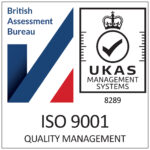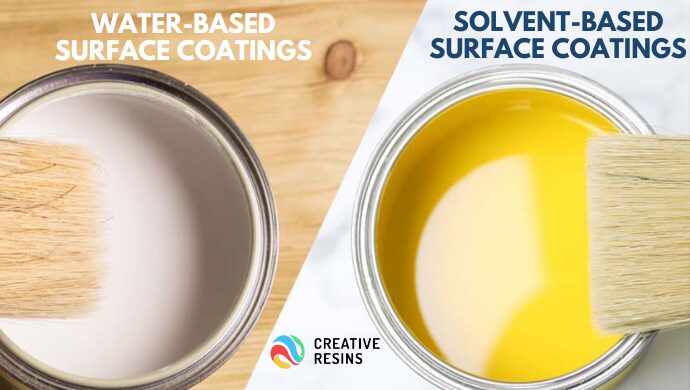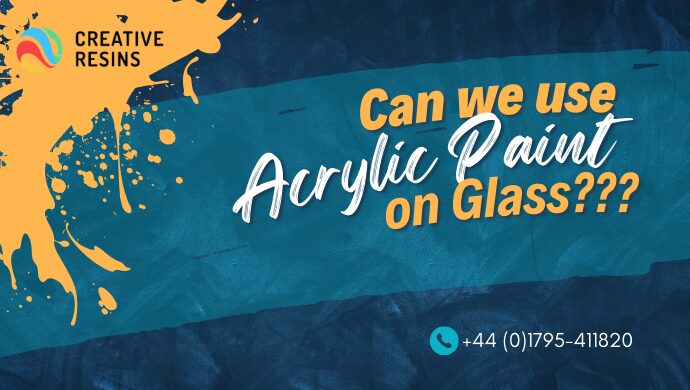Month: April 2024
Exploring the Differences: Water-Based vs. Solvent-Based Surface Coatings
Water-based and solvent-based surface coatings are two main types of coatings utilized across various industries, each with its advantages and disadvantages. Understanding the distinctions between these coatings is vital for choosing the most appropriate option for specific applications. Let us explore the characteristics of both water-based and solvent-based coatings to help you make an informed decision.
Water-Based Surface Coatings
Water-based coatings employ water as their primary solvent. They are known for quick drying times and low odor, making them more convenient and safer in industrial and residential settings. They are effortless to clean, eliminating the need for harsh chemicals or solvents. This simplifies the painting process and reduces the environmental impact associated with cleaning up after painting projects. They possess excellent adhesion properties and can be applied to surfaces with minimal preparation, resulting in a more efficient and cost-effective coating solution. They offer several benefits:
Lower odor levels
Lower odor levels are a significant benefit of water-based coatings over solvent-based alternatives. The reduced presence of solid odors makes the application process more pleasant and minimizes disruptions. Lower odor levels have environmental benefits, as they contribute to reduced emissions of volatile organic compounds (VOCs). Water-based coatings are often seen as more sustainable due to their lower VOC content, making them a preferred choice for environmentally-conscious consumers and businesses aiming to reduce their carbon footprint.
Fewer health hazards during application
When comparing water-based and solvent-based coatings, an essential factor to consider is the health hazards during application. Water-based coatings contain lower amounts of VOCs, which are known to contribute to air pollution. Applying water-based coatings often results in a lower odor level, making it more comfortable for workers and occupants where the coating is being applied. These coatings also tend to dry faster.
Reduced flammability
Reduced flammability is critical when choosing coatings for workers in confined spaces. Water-based coatings have lower Volatile Organic Compound (VOC) content, making them less combustible and safer for use in enclosed environments. Workers in such areas can benefit significantly from the reduced flammability of water-based coatings, providing them with a safer working environment.
Emit fewer VOCs
Water-based coatings are becoming increasingly popular in the industrial sector due to their eco-friendly nature. One key advantage they offer is reducing volatile organic compound (VOC) emissions, which helps companies meet stringent environmental regulations and minimize their ecological footprint. The lower VOC content in water-based coatings benefits the environment and creates healthier workplaces for employees. By emitting fewer harmful chemicals during application, these coatings help improve indoor air quality. This can lead to a boost in employee morale and productivity while enhancing overall well-being within company premises.
Less susceptible to temperature and humidity fluctuations
Water-based coatings maintain their consistency and performance even in varying climate conditions. This makes them a preferred choice for areas with extreme temperatures or high humidity levels, where solvent-based alternatives might encounter difficulties. Water-based coatings’ resistance to temperature and humidity fluctuations leads to more predictable application outcomes. This level of reliability can be crucial for achieving a high-quality finish in challenging environments or when working on intricate projects that require precise coating application. Ultimately, the ability of water-based coatings to withstand these external factors showcases their versatility and adaptability, making them a practical and effective option for various painting and coating scenarios.
Solvent-Based Surface Coatings
Solvent-based coatings have long been favored in industrial and commercial applications for their numerous benefits. They are excellently resistant to chemicals and solvents and typically offer a smooth and glossy finish that enhances the aesthetic appeal of coated surfaces. When it comes to challenging environments or demanding performance requirements, solvent-based coatings are often the go-to choice due to their reliability and robust properties. Their versatility further expands their applicability across various projects and industries, making them a valuable asset in the coating industry landscape.
Better chemical resistance
Regarding better chemical resistance, solvent-based coatings tend to outperform water-based alternatives. This is because solvent-based coatings typically create a more rigid and durable protective layer that is less susceptible to damage from aggressive chemicals. The solvents in these coatings help them form a stronger bond with the surface, enhancing their ability to withstand harsh environments. The chemical structure of solvent-based coatings allows for greater formulation flexibility, enabling manufacturers to tailor the product to specific chemical resistance requirements. This customization can be particularly beneficial in industries where exposure to corrosive substances is daily, such as automotive manufacturing or industrial equipment production.
Durability
Durability is vital to consider when choosing between water-based and solvent-based coatings. While both options provide protective layers, the long-term resilience of the surface can vary significantly. Water-based coatings often excel in indoor environments, offering excellent durability against stains and scratches. However, solvent-based coatings tend to outperform their counterparts when it comes to high-traffic areas or outdoor applications exposed to harsh elements. The critical difference lies in how these coatings interact with surfaces over time. Solvent-based coatings form a strong bond with substrates, creating a durable barrier that can withstand heavy wear and tear. On the other hand, water-based coatings may require more frequent touch-ups or recoating in demanding environments to maintain durability. Understanding your project’s specific requirements is essential for achieving optimal longevity and performance results.
Faster drying times
This solvent-based coating aspect can significantly increase efficiency in various applications, reducing downtime and allowing for quicker turnaround times. The quicker drying also means multiple coats can be applied in less time, increasing productivity. Faster drying times can improve operational efficiency and create a more sustainable painting process.
Less susceptible to water damage
Surface preparation is vital in the coating application process and can significantly impact the durability and performance of the final finish. One key advantage of solvent-based coatings during surface preparation is their reduced susceptibility to water damage compared to water-based coatings. This resilience is particularly beneficial when working in damp or high-humidity conditions. The ability of solvent-based coatings to withstand moisture exposure during surface preparation can result in a smoother and more uniform finish, ultimately leading to better adhesion and longevity of the coating. This quality makes solvent-based coatings an ideal choice for projects where quick drying times are essential, reducing the risk of rework due to water-related issues. By selecting a coating less susceptible to water damage during surface preparation, contractors and DIY enthusiasts can achieve professional results with ease and confidence.
Can perform better in extreme temperatures
Water and solvent-based coatings have unique properties determining their performance in extreme temperatures. Water-based coatings tend to excel in hot climates as they are less likely to dry out quickly or become brittle than solvent-based options. The flexibility of water-based coatings allows them to maintain their integrity even when subjected to high temperatures. Solvent-based coatings have shown better resistance in freezing conditions due to their ability to withstand low temperatures without losing their structural strength. This makes them ideal for cold-weather applications where durability is essential. Understanding how each type of coating performs under extreme temperature variations is crucial for selecting the most suitable option based on the specific environmental conditions and requirements of the project at hand.
In conclusion, the choice between water-based and solvent-based coatings depends on various factors, including application requirements, environmental considerations, and safety concerns. While water-based coatings offer advantages such as lower VOC emissions and improved safety, solvent-based coatings excel in durability and performance in extreme conditions. Consulting with professionals knowledgeable about both types of coatings is crucial to ensure the selection of the most suitable option for each specific project. By weighing the advantages and disadvantages of water-based and solvent-based coatings, companies can achieve optimal results while adhering to environmental regulations and maintaining a safe work environment.
We at Creative Resins offer superior-quality water-based and solvent-based coatings at the best prices. We provide Surface Coatings for Composite Doors, PVCu Windows, Plastics, Metals, Woods, and Floor Paints. Our high-performance industrial-quality coatings allow for an endless colour choice and long-term warranties and guarantees for a variety of substrates. Call us now! – 01795 411820.
Can we use Acrylic Paint on Glass?
Glass painting is an art form that has captured the imaginations of artists for centuries, with its delicate beauty and unique challenges. While traditional methods like stained glass and glass blowing are well-known, have you ever considered using acrylic paint on glass? Imagine the possibilities – vibrant colours shimmering through the transparent surface, creating a mesmerising effect that blurs the line between painting and sculpture. Let us explore the intriguing question: Can acrylic paint be used on glass? Join us as we delve into this innovative technique and uncover the secrets of combining two seemingly contrasting mediums to create stunning works of art that will leave you in awe.
Specially formulated transparent Acrylic Glass Paints offer several advantages:
Permanent Adhesion
These paints are designed to adhere permanently to glass surfaces, ensuring long-lasting results without peeling or flaking.
Weathering Properties
They resist weather conditions such as rain, sunlight, and temperature fluctuations, making them suitable for exterior applications. This durability ensures the painted glass maintains its appearance over time, even in harsh outdoor environments.
Versatile Application methods
The ability to apply these paints using a variety of methods, including brush, pipette, aerosol can, or spray gun, provides flexibility for different projects and preferences. Whether it’s fine detailing with a brush or quick, even coverage with a spray gun, these paints offer options for every application need.
Water clear transparency
The transparent nature of the paint allows for the retention of the glass’s natural clarity while adding colour or design. This transparency is especially beneficial for projects where visibility through the glass is desired, such as windows or glass doors.
10-Year External Warranty
The inclusion of a 10-year external warranty speaks to the manufacturer’s confidence in the durability and longevity of their product. This warranty provides users with peace of mind, knowing that their investment is protected against premature deterioration or fading.
Overall, these specially formulated acrylic glass paints combine permanent adhesion, weather resistance, versatile application methods, transparency, and a long-term warranty to offer a high-quality solution for exterior glass projects.
Glass preparation
Cleaning the glass surface thoroughly before applying glass paints is crucial for achieving good adhesion and a professional finish. Using a specially formulated deep cleaning solution like those supplied by Creative Resins Ltd can ensure that any contaminants or residues are removed, allowing the adhesion additive in the glass paint to bond effectively to the glass surface. This promotes durability and long-lasting results.
GlassPaints offers a wide range of colour options through Creative Resins’ colour match software, ensuring precise formulations to match various colour charts like RAL, Pantone, and BS. Additionally, GlassPaints are available in both translucent and opaque formats and come in solvent-based and water-based versions to suit different preferences and applications.
We at Creative Resins offer premium-quality pre-mixed Acrylic Epoxy Resin Paint for Glass at the best prices. It is suitable for glass splashbacks, glass cladding, toughened glass, glass table tops, and bathroom glass panels. It can also be used behind hobs and ovens in kitchen areas. It is waterproof, UV stable, and weatherproof. It is fast-drying and can be effortlessly applied using a spray gun. Call us now! – 01795 411820




